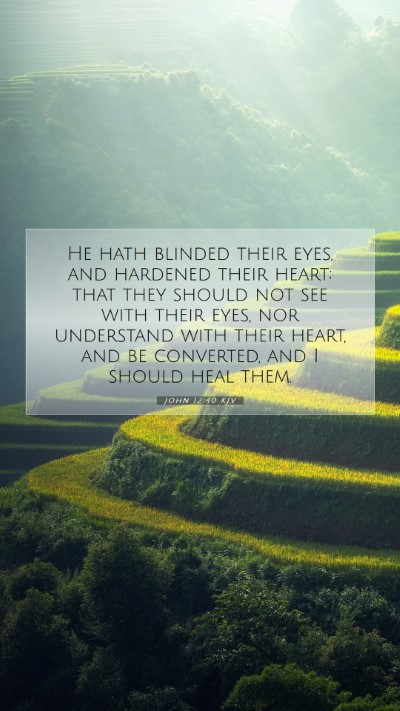Bible Verse Meaning: John 12:40
This passage from the Book of John reads: "He has blinded their eyes and hardened their hearts, so they can neither see nor understand, nor turn—and I would heal them." (John 12:40, NIV). In this verse, the Gospel writer John references the judgment on those who have rejected Jesus. The implications of this passage carry significant weight in understanding the nature of belief and divine sovereignty.
Summary of Insights from Public Domain Commentaries
The following insights are drawn from esteemed biblical commentators such as Matthew Henry, Albert Barnes, and Adam Clarke, providing a cohesive understanding of the verse:
-
Divine Sovereignty:
John 12:40 reflects the profound truth about God’s sovereignty. According to Matthew Henry, the reference to God blinding their eyes indicates that there are times when individuals, due to their rejection of truth, become unable to perceive the spiritual realities around them. This highlights the dynamic where persistent disbelief leads to further hardening of one's heart.
-
Judgment and Mercy:
Albert Barnes emphasizes the duality of judgment and mercy in this verse. He notes that while God actively allows blindness as a form of judgment, He also desires healing and repentance. The harsh reality of spiritual blindness comes with the heart's resistance to turn toward God.
-
Consequences of Rejection:
From Adam Clarke's commentary, it is explained that the hardness of heart is not merely a passive state but a result of a conscious and repeated rejection of God’s work and signs, which leads to a self-imposed blindness. Clarke draws attention to the repercussions this has on a person's spiritual journey.
Understanding the Spiritual Significance
This verse encapsulates the critical theme of spiritual blindness that results from continuous resistance to divine truth. Below are key concepts that serve to deepen our Bible verse understanding:
-
The Nature of Spiritual Blindness:
Spiritual blindness results from a deliberate choice to reject God. This verse serves as a warning that failure to respond to God’s revelation can result in a hardened heart and inability to see the truth.
-
The Role of God’s Initiative:
Despite humanity's rejection, God’s narrative includes a longing to heal and restore. This dual aspect of judgment and mercy presents a complex relationship between divine will and human free choice.
-
Old Testament Prophecy:
The verse invokes themes consistent with Old Testament prophecies, particularly those found in Isaiah. It urges biblical scholars to understand how the prophecies regarding Israel’s spiritual state find a culmination in the life and ministry of Jesus Christ.
Cross References
This verse of John 12:40 can be cross-referenced with several other significant passages:
- Isaiah 6:9-10: A direct prophecy referred to by Jesus regarding spiritual blindness.
- Matthew 13:14-15: Jesus quotes Isaiah to explain the inability of some to understand His parables.
- Romans 11:7-8: Discusses Israel's stumbling and hardening, echoing themes in John 12:40.
Application of John 12:40
Understanding this verse is crucial for modern believers. It compels individuals to reflect deeply on their responsiveness to God’s call. Below are some Bible study applications:
-
Self-Examination:
Believers should frequently assess their hearts for any signs of hardness or blindness. Are there areas in life where one may be resisting God?
-
Encouragement to Pray:
Praying for enlightenment and softening of hearts, both for oneself and others, aligns with the Father's desire to heal.
-
Engagement with Scripture:
Engaging with Scripture through online Bible study resources can promote understanding and prevent spiritual blindness through the nourishment of the Word.
Conclusion: The Message of John 12:40
In conclusion, John 12:40 serves as a stark reminder about the consequences of rejecting God's truth while simultaneously presenting God’s desire for repentance and healing. For anyone delving into Bible verse meanings and seeking Bible verse interpretations, this verse encapsulates the gravity of spiritual choice and the importance of remaining open to God's transformative power.


